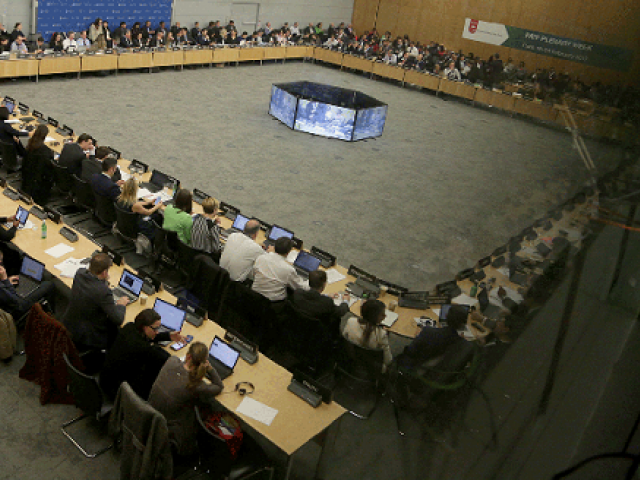US asks Pakistan to extend FATF scope to economy
In case of blacklisting, Pakistan's banking sector would be seriously constrained

PHOTO: FILE
The US delegation that is in the town for an on-ground assessment of implementation on the 27-point Action Plan of the FATF met on Wednesday with Federal Minister Hammad Azhar who is also a coordinator on FATF affairs from the civilian side.
During their interaction with private and public sectors, which began on Monday in Karachi, the US authorities were getting first-hand information about the country's preparedness to deliver on the FATF Action Plan and the actual improvement in the Anti-Money Laundering (AML) and Combating Financing of Terrorism (CFT) regime.
Pakistan meets all FATF requirements
Azhar has recently been appointed as coordinator of a cabinet body that is overseeing implementation on the FATF Action Plan. This is in addition to the National Executive Committee on AML that is headed by Advisor to Prime Minister on Finance Dr Abdul Hafeez Shaikh.
The sources said that the US delegation discussed the loopholes in the financial system and its lack of coverage of various sectors of the economy.
They said that the US authorities were of the view that about one-fourth transactions were still taking place outside the formal banking sector.
They advised to take measures that could fully capture the business transactions in the real estate and the agriculture sectors, the sources said.
The delegation held discussions about the implementation status of the 27-point Action Plan. Two days ago, the US Treasury officials also met with the private sector in Karachi aimed at getting their feedback about improvements in Pakistan's financial system.
Sources told The Express Tribune that during meeting with the government officials, the US delegation acknowledged the work done by Pakistan during past 15 months but expressed concerns over slow progress that would result in the missing of many of the agreed action points.
The delegation urged Pakistani authorities to put more concerted efforts to address the deficiencies in AML and CFT regimes, which led to grey listing of Pakistan with effect from June last year.
Pakistani officials informed the US delegation that the country did its best despite serious institutional capacity constraints during past 15 months. They urged the US authorities to review the country's progress instead of judging it on the 27 goals, the sources said.
The US delegation came to Pakistan nearly two weeks before the government is set to submit a report on August 13 for the review of the Joint Group (JG) of the International Cooperation Review Group (ICRG) of the Asia Pacific Group (APG).
The joint group would discuss the findings of the report in a face-to-face meeting that will be held in Bangkok from September 9 to 13.
Pakistan is a member of the APG and its case is being presented before the FATF by the APG. India's Financial Intelligence Unit's (FIU) director general and the US Assistant Treasury Secretary Marshall Billingslea co-chair the Joint Group.
Pakistan presented a weak case in the last FATF review meeting, as the country could hardly show progress on one-fourth of the agreed Action Plan, the sources said.
One of the early impressions of the US treasury department officials was that Pakistan was verbally claiming a lot of progress but the country had not demonstrated it in a written report, backed by some concrete evidence, according to the sources.
Islamabad had been given a 27-point Action Plan that the country was supposed to implement till September 2019. In February last year, the FATF decided to place Pakistan on the grey list of countries whose terrorism financing and anti-money laundering laws are described as deficient with effect from June 2018.
Exiting FATF grey list vital for IMF deal: Daban
"We have made a lot of progress since June last year but yes we have not still reached to an ideal situation," a senior government official said on condition of anonymity.
He said that Pakistan still needed more time to fully implement the 27-point Action Plan and that the government would work with international partners to seek more time from the FATF, he added.
The FATF October plenary will decide the fate of Pakistan.
In case of blacklisting, Pakistan's banking sector would be seriously constrained. It could also undermine implementation on the IMF's $6 billion deal.
Sources said that Pakistan was now looking to buy some more time and it would try to reach to a longer period Action Plan with Asian Pacific Group that has also separately undertaken Mutual Evaluation of the country.
The APG's Mutual Evaluation meetings would start from August 18 in Australia.
Despite the severity of the issue, various Pakistani departments could not jell together to fully address systemic deficiencies. There were serious issues of coordination among these departments.
Only last week, the government decided to set up joint teams of Pakistan Customs, Directorate of Intelligence and Investigation, Federal Investigation Agency and Frontier Corps to curb illegal movement of currency through land border stations.
It has decided to deploy these teams at Chaman, Taftan, Torkham, Ghulam Khan, Kharlachi, Tank and Wagha borders.
Currency smuggling for money laundering and terrorism financing is among the main deficiencies pointed out by the APG and the FATF.




1733130350-0/Untitled-design-(76)1733130350-0-208x130.webp)













COMMENTS
Comments are moderated and generally will be posted if they are on-topic and not abusive.
For more information, please see our Comments FAQ